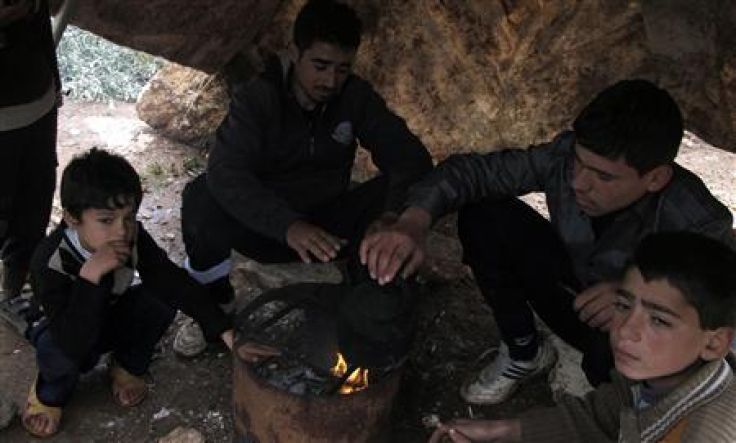US Recognizes Syrian Opposition As Assad's End Draws Near

As we enter what seems to be the end-game to the Syrian conflict, a war that has eaten up nearly two years and 40,000 lives, the numbers of refugees and bodies are soaring and the bombs are falling faster than ever.
The U.N.'s main human rights body estimates the number of Syrian refugees abroad will top 700,000 before the year's end. Another 2 million Syrians are still in the country but have fled their homes.
Explosions rained on Damascus on Wednesday: The Syrian Observatory for Human Rights in the U.K. said at least 25 people were killed. State news agency SANA reported that seven people were killed by a car bomb outside the Interior Ministry. Another car bomb near the Palace of Justice killed one person, Al-Jazeera reported. The government agencies called the explosions "terrorist bombings."
Government forces have also begun to use incendiary weapons in populated areas, Human Rights Watch said, perhaps a precursor to the much-feared and much-denounced use of chemical weapons.
For now, it seems only a matter of time before President Bashar al-Assad goes, but there seems a definite change in momentum in favor of the opposition, the Israeli newspaper Haaretz reported. Free Syrian Army attacks on the airport in Damascus have succeeded in disrupting normal operations, scoring a huge victory for the opposition. In the event the airport is taken over by the FSA, analysts project that could spell the end for Assad.
The gains made by the opposition in recent days were bolstered by financial, military and political support from abroad. On Tuesday President Barack Obama announced that the U.S. now officially recognizes the Syrian National Coalition, the political arm of the opposition. Speaking to ABC news, Obama said, "We've made a decision that the Syrian Opposition Coalition is now inclusive enough, is reflective and representative enough of the Syrian population that we consider them the legitimate representative of the Syrian people in opposition to the Assad regime."
The U.S. made their announcement just a day before the Friends of Syria group, a coalition of U.N. states who oppose the Assad regime, announced their backing of the Syrian National Coalition. The group was meeting in Marrakesh, Morocco.
The European Union has yet to fully recognize the opposition as the legitimate Syrian government, but France and Britain have thrown their support in, and are encouraging the EU to do the same. On Monday, SNC head Ahmed Moaz al-Khatib met with EU foreign ministers in Brussels to make his case, al-Arabiya reported.
British Foreign Secretary William Hague told the press ahead of the meetings, "We've given our full recognition to them, we hope that other countries will do so at the Friends of Syria meeting in Marrakesh."
German Foreign Minister Guido Westerwelle said that the SNC "represents the legitimate interests of the Syrian people. We want that to be recognized as such by the European Union."
The U.S. does not seem to be making any moves in the direction of providing military assistance. Speaking to the press on Tuesday, White House spokesman Jay Carney emphasized that the U.S. has only sent over non-lethal aid and humanitarian aid.
Libya has publicly provided weapons to the FSA, and mercenaries have flowed in from Algeria, Tunisia, Jordan and Saudi Arabia. The U.K. to date has sent communication equipment, but there are no reports of the U.K. supplying weapons.
In a statement on Wednesday at the Friends of Syria Meeting in Morocco, U.N. Secretary General Ban Ki-Moon said it was "still possible to avert the worst-case scenario."
"Left to themselves, the current dynamics risk the disintegration of Syrian state institutions and full-fledged civil war, with widespread killings along ethnic and confessional lines,” Ban said, calling for the international community to unite in support of Syria. “Building a free and democratic Syria will require negotiations and genuine political dialogue," he said.
© Copyright IBTimes 2024. All rights reserved.












